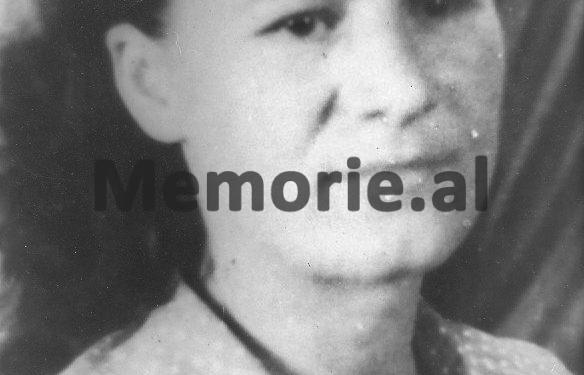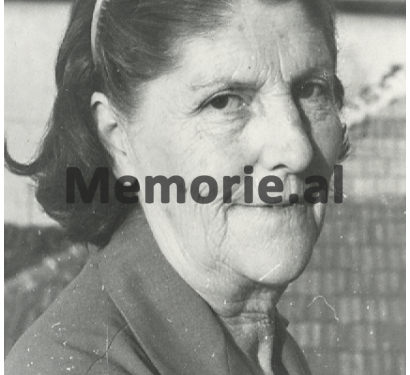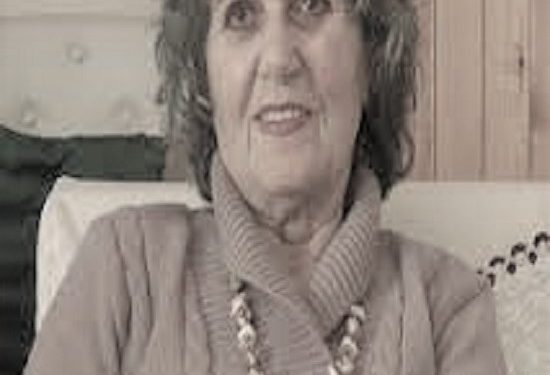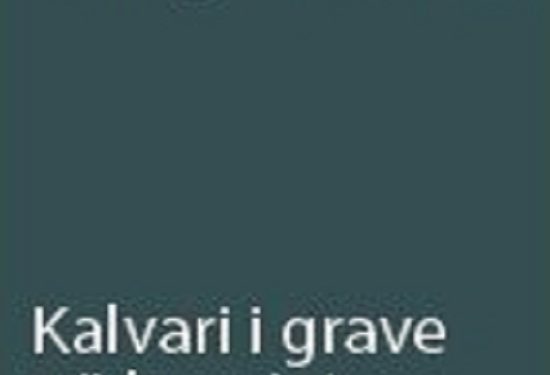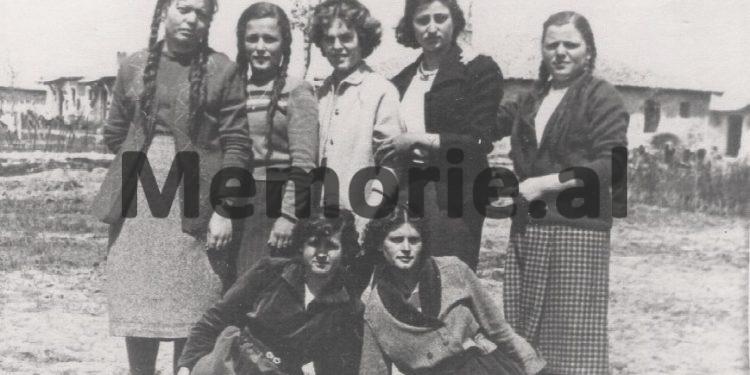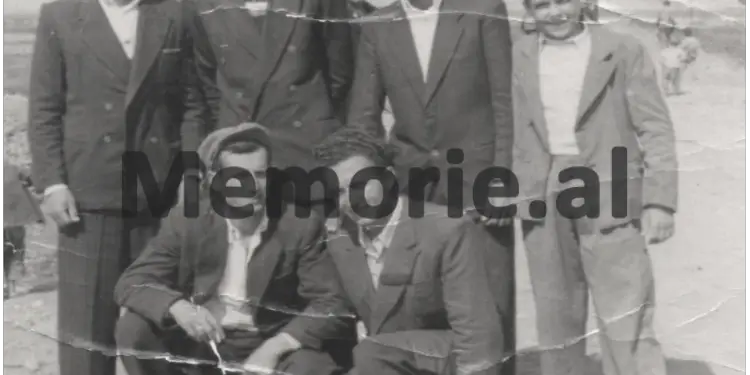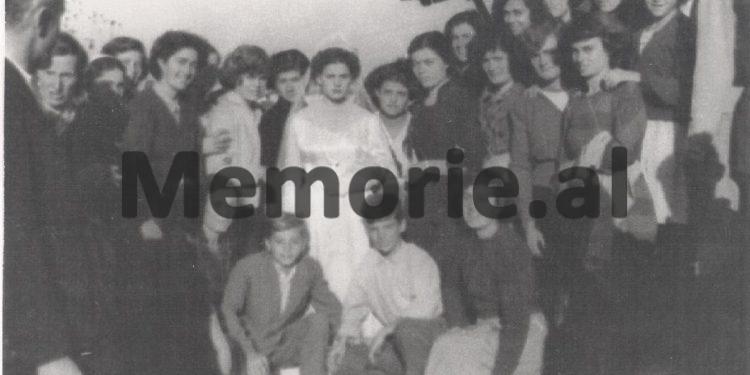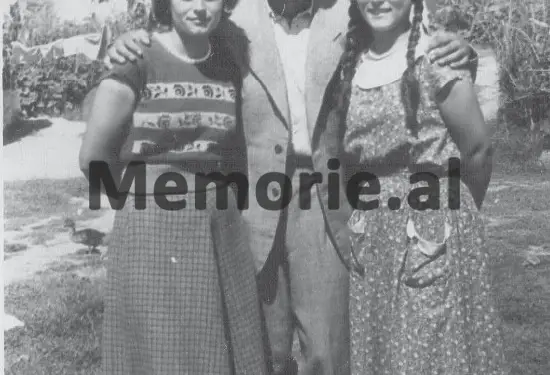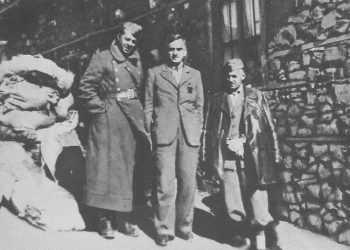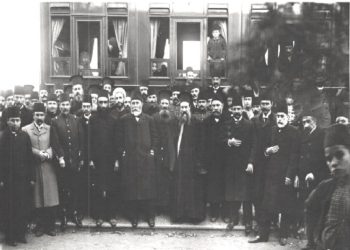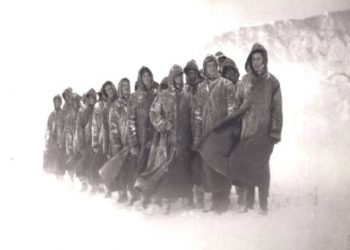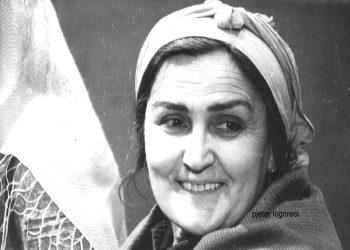Fatbardha Mulleti (Saraçi)
Part twelve
Memorie.al publishes some parts from the book ‘Calvary of women in communist prisons’, by Fatbardha Mulleti Saraçi, (granddaughter of the famous former mayor of Tirana, Qazim Mulleti), whose family from 1944 until in 1991, he was persecuted by the communist regime of Enver Hoxha, where Fatbardha’s father, Haki Mulleti, a former senior state administration official since the 1920s, was imprisoned and interned by his family, until died in the hospital of Tirana, poisoned by the State Security. In her book ‘The Calvary of Women in Communist Prisons’, which is the fruit of several years of work, the author has masterfully described the unknown stories of some of the Albanian women and girls who suffered in prisons and internments in the dictatorial regime of Enver Hoxha, started by her mother, Pertefe Mulleti, and in turn: Marie Deda, Hajrie Kazazi, Kushe Seknej, Mrike Pali, Zyliha Rusi, Roza Jakova, Fatime Dilaveri, Hatixhe Pipa, Marije Gjoka, Angjelina Topalli, Hatixhe Kopliku, Nafije Kop Bushati, Budije Bushati, Adile Kazazi, Antonela Dostanishta, Nafije Stërmasi, Luçije Saraçi, Adile Meta, Qeuthere Meta, Feride Damnori, Vitore Ashta, Fetije Vuçiterni, Zehnije Gjylbegu, Xhyhere Kazazi, Luçije Malaj, Leadije Kazazi, Sadije Kazazi Hava Repishti, Luçije Kurti, Rukije Bushati, Shaqe Logoreci, Qamile Myftija, Marie Ndokëllia, Rozë Çefa, Çile Staku, Shaqe Marku, Lajde Arapi, Lutfije Barbullushi, Syme Muka, Zenepe Kraja, Fahrije Kazazi, Naxhije Plari, , Lizë Vukeli, Bade Kjaraj, Hava Baçi, Xhehadire Boriçi, Vitore Kalaj, Katerina Benusi, Sofije Baja, Lenë Pjetri, Dava Markagjoni, Mrika Markagjoni, Marta Gjonmarkaj, Bardha Gjon Markagjoni, Kristina Gjomarkaj, Çelestina Pervizarki, Kune Miraka, Sultana Dine, Vera Dine, Agime Dine, Hamide Çela, Vera Dine, Kadrije Cami, Sanije Sulaj, Meliha Sulaj, Vashe Kola, Prena Llesh Gjeçi, Gjystina Seku, Ilda Melgusha, Agime Pipa (Aranitasi), Terezina Pali, Liza Pali, Adile Boletini, Nasibe Kazazi, Ana Daja, Dila Zef Ndoja, Zyraka Mano, Shanisha Dosti, Zojë Gjeloshi, Drane Stakja, Elena Luli, Sabiha Kasimati, Marije Deda, Marije Shllaku, Biçe Pistulli, Sadije Kazazi, Gjyzepina Çoba, Marta Doda , Frida Satedini, Vitore Kuka, Gjela Llesh Biba, Bardha Cub Marku, Liza Llesh Mali, Bardha Mark Bushkola, Marije Tuci, Olimbi Baruti, Angje Kovaçi, Bedrije Ashikja, Musine Kokalari, Motër Gjeorgjina, Liljana Radovani, Laura Keqi, M Mrike Zadeja, Angjelina Shantoja, Naime Koçi, Sheriar Sefa, Vitore Shllaku, Liza Gjon Voci, Nina Shiroka, Laje Mehmeti (RRema), Feride Beshiri (Quku), Hasije Ulqinaku (Quku), Sofije Kali, Çile Gjush Larja, Nurfezo Koprencka, Sanije Gjylbegu, Emilja Shest Bregu, Vida Radovani, Nedrete Pipa, Motrat e Osman Kazazi, Safete Jusif Sokoli, Çiljeta Simoni, Lutfije Buashati, Sadije Bushati, Olga Schëeizer Libohova, Evelina e Ndoc Naraçi, Geraldina Apony-Zogu, Hilda Zyma. Marie Rafael, Zade Muka, Rukije Bushati, Hajrie Vrioni, Emine Gjyrezi, Xhemile Beqir Komi, Hedije Dume Repishti, Syme Muka, Fetije Vuçiterni, Sebije Puka, Marjeta Serreqi, Dhurata Sokoli, Klara Miraka (Merlika), Asi , Liri Cenaj, Rudina Dema, Adelajde Miraka, Drane Jakja, Syriha Hasi, Aishe Gogaj, Luçija Kaçaj, Gjyljana Malaj (Pervizi), Nadide Kasaruho, Nadire Kërçiku (Peshkëpia), Shpresa Ballolli (Merdani), Makbule Frashëri, Misly Çrash Dervishi (Leka), Natali Arkandi Rozengolc (Pengili), Vigelmina Vitalij Kovaleshko (Veshi), Rukije Rama, Tefta Tasi, Liri Lubonja, Kozara Kati, Shpresa Ngjela, Vera Bekteshi, etc.
Continued from the previous issue
Vitore Kalaj
(1926 – 2007)
Only God knows how Vitore Kalaj’s life went. All suffering on a higher scale. For most of her life. They, d.m.th. the sufferings started when, when she was three weeks old, the Montenegrin chauvinists killed her father (she lived in Gruda, under foreign rule) …!
The mother with him (when she was only three weeks old) and the brother, only three years old, take the road of escape, towards Shkodra:. Although small, they carried with them the echo of anti-Ottoman resistance, before 1912, anti-Montenegrin, after it. Nandor 1944. A sick mother already with two children who had grown up.
The boy was sentenced to life imprisonment by the communists for his political beliefs. Later, almost forever – 30 years in prison. “Oh God,” Vitorja will recall, “I just cried, an only brother in prison, a sick mother at home.”
A desolate sister and a desolate girl would only work to support them. What a fate we deserve! Only heavy work, where they were heavier. And where to find the others? Thus, young woman, instead of enjoying the life once given to her, and she had come, Vitorja would follow everywhere her only brother, the pillar of the house, in the segments of communist hell. Hundreds, like thousands of other girls and women, who held the family sacred: more on foot than in the carriages of trucks, loaded with straps filled with food and clothing secured with fingernails, with a legitimate desire: to meet and make life easier for her brother, her blood. Help him as much as he can. Eh, how many women and girls like her headed to those places..!
Like the slaves of antiquity…! As in teaching history…! For her she would also give her life. Without wanting to remember the sister of Gjergj Elez Alia…! Thus, in Beden (how many times will we be forced to mention this name?), In Ura Vajgurore, in Maliq, in Rinas, places known to those who left there even the most beautiful part of their lives.
The beautiful Albanian epic recognizes the binomial Gjergj Elez Alia and her sister and their self-denial, which nevertheless lasted only 9 years. Vitorja “would wash the graves” of her brother, not nanda, but several times more. “To be in all four corners of Albania, I will come”, – she would answer her brother, when he once said to her: “I did not think that anyone would come to see me so far away”! For Vitore there was no other trinomial than: brother, mother, work. With work, that is, to feed his brother in prison and his sick mother in bed. Could there be another sacrifice? What were these jobs? In the heat, in the presence of moisture, caustic soda, cold and extreme heat. (Be patient, heart, be patient).
Work, only work. Even quality work of inventions, rationalizations. That man has the brain to ease the toil. No reward. No rating. Her work would be swallowed up by others. Always with an occupational disease: “I will never forget,” she would later recall, “how my brother once saw my bandaged hands and feet. He realized that I had worked as a man, mowing the grass… ”! He knows what he felt.
He got sick from hard work. His brother found him in this condition when he was finally released from prison. He got married, but did not last long and died, leaving two orphans.
Unmarried, baptized, and now her brother’s orphans. Suffering … suffering … suffering … “! ”Do you regret that life went on like this?” they asked him once. And she unequivocally replied: “If it happened to me again; I would also continue for my people, do not let them die on the streets … “! This is Vitore Kalaj.
Katerina Benusi
(1906 – 1988)
Even for Katerina Benusi, the source of all family suffering was with the coming to the throne of Enver Hoxha with his clique. It was not just his political opponents that he eliminated. He described the whole layer of intellectuals as such, who soon filled the prisons of Albania. Not even her husband, the lawyer we heard from everyone, Baltazar Benusi, escaped. It was 1946. After a year of torture, we turned him into a lifelong invalid; he was sentenced as an anti-communist to 15 years, which he spent in Tirana and Burrel. What did the family suffer with his imprisonment?
After the movable and immovable property was confiscated, they were expelled from Tirana. To provide food and bread crumbs, at the age of 40, he was forced to try hard seasonal work in agriculture. He could not get his pension because his health condition did not allow him to work long hours. Most tiring for him was when he took the Burrell Road (1947-1954). It is known what sacrifices he had to make to bring him food and medicine. It was difficult to provide for her at that time, but the other years (1954-1958) were more difficult, when her husband was deported directly from prison to the villages of Lushnja and Kurvelesh. It took him many times to do even 8 hours on foot, so we loaded him until he got to the place.
The boys did not have the best luck either. Excellent in teaching, but without the right to study, they too were subjected to heavy work away from home: sometimes on hydropower sites and sometimes on drying out swamps. Constantly pointing. “What did others have more than her children?” He kept asking himself this question, to which he gave the answer himself. There was a plan for imprisonment; there was also a plan for study rights. Some of the mother and some of the stepmother. It was class warfare. She understood very well the terrible time the country was going through. He never despised work. Rather she was the best counselor of her sons: to be honest and good workers. Thus, with the thought that the children grew up like that, he grew up happy. Severely ill for many years, died in 1988.
Sofije Baja
(1900-1979)
Sofije Baja comes from that part of Bushatllinj, which immediately faced the communist regime. It was not enough, his brother was even shot and two others were sentenced to 30 years in prison. (It was the same as killing them). So, soon, the communists would divide his family with two … It was not a joke. For nationalist convictions, you were punished more than in the time of fascism..!
She was married, but she felt the consequences immediately. Deprivation of property was only a bad thing (nationalization, taxes, and endless taxes). Her teacher son in Kelmend, do not wait any longer, escapes.
Consequences? Of course, the beginning was the deportation: the father with 3 years and the brother with one year: both in Tepelena. Thus, Sofia was left alone and by the way in the full sense of the word, she had to think about them, then about herself. He was 50 years old. Not a little for a woman in trouble…!
The jobs he would do? This is also understood: work for the “declassed”. She had the “luck” to produce bricks and tiles: sometimes to prepare the mud on foot, sometimes in the so-called dry transport, and sometimes in the scorching heat of the kiln mouth. From morning to evening. All day on foot, with half-empty stomach. And since the profits were not enough, at night, it is secretly understood, that private work was taboo, he would sew quilts for brides who would start a new life: he wished the couples a happy life, every time he crossed the new atlas in the needle, and on the other hand she sighed for her black fate, she always had her mind on the boy who did not know where she was. Was he alive or not, who did not write them, or the Security blocked his letters, who knows. Then with the mind to the other husband and son in exile. How were their worries? Were they sick? That next time he had found it that way and left it that way? Were they hungry? How long would they stay there? So night after night, you worked with needles and saw. That’s how the work was done, and the time passed faster.
But he was not alone. He had a brother, he had friends, and he had neighbors, who did not lack warmth, respect, and care. She too. That he was known by all for the virtues he had. Her heart was not narrowed. She was tired, but not shrunken. It was always big and opens to the good people around it. Despite the great troubles.
The husband and son, after returning from exile, joined in the hard work: the husband by her side, and the son under construction. All three at war with the difficult, the heavy. Mind beyond the border. It had been 40 years since he had fled and no news had arrived. Every night Mother Sofia, in a low voice and with all her heart, would wish her: “Good night, son, wherever you are.”
He died with a broken heart for him, but also with the joy given to him by his grandchildren, who filled his house…
Leave Peter
(1936)
For Lena Peter, the night of March 22, 1964 was longer than the others, and in the middle of it, marked the border of two lives and the beginning of a long and painful suffering. It was the hail of machine guns of the border soldiers that marked this. The event took place below the village of Jubicë (Water Edge), at the foot of Lake Shkodra. Lena Peter, her husband and six children (the youngest 2 weeks) tried to escape, but ran into the border unit, who spent all the bullets on her husband, who, however, managed to escape. Enraged, with their bayonets stuck, they threatened to kill Lena and terrorized the languishing children. The investigation at the border post began, which seemed to her to have lasted a century. When it was learned that she and the children would be interned, the husband surrendered to the Home Affairs Branch. The court sentenced him to 10 years in prison, which he suffered in Spaç.
If the night of March 22 for Lena was long and painful, the others who came back were endlessly like that. Several thousand nights. They were more difficult when the children gathered around and asked for bread and she did not have any. The tales he told them in no way replaced bread. The tales already surprised them, but they did not quench the hunger of the little ones. The profits in the cooperative were negligible. How to raise children? How to help her husband? He still had to face the psychological pressures of the small communist rulers.
With all that trouble, she followed her husband to prison, sending him food provided with unspeakable sacrifices. When he left he had to get permission from the brigadier, and he somewhere else. When he returned he had to give an account to the party organization. Once, 5 years later, the communists did not hesitate to tell her that after her husband was released from prison, she would be admitted there, as she was also convicted, but they had not communicated to her yet.
The years passed very slowly. Through an extreme of poverty the children grew up with the mind of the father. He finally joined the family, but the worries were not shared. She was already a declassed family and had to face persecution, which she did not share, until the dictatorship was overthrown.
Fatbardha Haki Mulleti
He was born on 08/11/1939 in Tirana. From his father, Haki Mulleti, honest and patriotic servant inherited and nurtured with noble feelings. From the age of 5 he experienced Slavo-communist persecution. His father was imprisoned in 1945, while the family was interned in Kavaja, where he finished the 7-year school in 1952. He graduated from the “28 Nëntori” gymnasium in 1957 in Shkodra. Later she works as a teacher in the villages of Lezha: Kallmet, Manati, Blinisht and in Dajç of Zadrima. He continued his higher studies without leaving work and graduated from the Pedagogical Institute (2-year) in Tirana, branch Biology-Geography-Chemistry in 1963. While in 1970 he graduated from the University of Tirana in the branch of Chemistry-Biology. In 1975 he was expelled from education because of his “biography” and because he refused to cooperate with the State Security. Later she worked as a worker in the Wood Factory in Shkodra. The short married life (after her husband, Kole Saraçi, dies in 1990, after 8 years of marriage) gave her a son, Peter. Today she is involved in Albanian political life as president of the Women’s Forum of the ‘National Front’, participant of the association of former political prisoners and persecuted and a member of the Anti-Communist League of Albanian Women (LAGSH). She has worked and published in the press of the time articles in defense of her Albanian comrades, mothers and sisters and will continue her mission until her mind and hand work. Memorie.al




